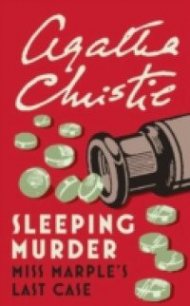Murder on the Orient Express - Christie Agatha (читать книги онлайн полностью .TXT) 📗
He pressed his own finger on the bell.
The conductor arrived promptly. He looked hot and worried.
“De l’eau minerale, s’il vous Plait.”
“Bien, Monsieur.” Perhaps a twinkle in Poirot’s eye led him to unburden himself. “La dame americaine–”
“Yes?”
He wiped his forehead. “Imagine to yourself the time I have had with her! She insists – but insists – that there is a man in her compartment! Figure to yourself, Monsieur. In a space of this size.” He swept a hand round. “Where would he conceal himself? I argue with her. I point out that it is impossible. She insists. She woke up, and there was a man there. And how, I ask, did he get out and leave the door bolted behind him? But she will not listen to reason. As though there were not enough to worry us already. This snow–”
“Snow?”
“But yes, Monsieur. Monsieur has not noticed? The train has stopped. We have run into a snowdrift. Heaven knows how long we shall be here. I remember once being snowed up for seven days.”
“Where are we?”
“Between Vincovci and Brod.”
“La-la,”said Poirot vexedly.
The man withdrew and returned with the water.
“Bon soir, Monsieur.”
Poirot drank a glass of water and composed himself to sleep.
He was just dropping off when something again woke him. This time it was as though something heavy had fallen with a thud against the door.
He sprang up, opened it and looked out. Nothing. But to his right, some distance down the corridor, a woman wrapped in a scarlet kimono was retreating from him. At the other end, sitting on his little seat, the conductor was entering up figures on large sheets of paper. Everything was deathly quiet.
“Decidedly I suffer from the nerves,” said Poirot and retired to bed again. This time he slept till morning.
When he awoke the train was still at a standstill. He raised a blind and looked out. Heavy banks of snow surrounded the train.
He glanced at his watch and saw that it was past nine o’clock.
At a quarter to ten, neat, spruce and dandified as ever, he made his way to the restaurant car, where a chorus of woe was going on.
Any barriers there might have been between the passengers had now quite broken down. All were united by a common misfortune. Mrs. Hubbard was loudest in her lamentations.
“My daughter said it would be the easiest way in the world. Just sit in the train until I got to Parrus. And now we may be here for days and days,” she wailed. “And my boat sails day after to-morrow. How am I going to catch it now? Why, I can’t even wire to cancel my passage. I’m just too mad to talk about it!”
The Italian said that he had urgent business himself in Milan. The large American said that that was “too bad, Ma’am,” and soothingly expressed a hope that the train might make up time.
“My sister – her children wait me,” said the Swedish lady, and wept. “I get no word to them. What they think? They will say bad things have happen to me.”
“How long shall we be here?” demanded Mary Debenham. “Doesn’t anybody know?”
Her voice sounded impatient, but Poirot noted that there were no signs of that almost feverish anxiety which she had displayed during the check to the Taurus Express.
Mrs. Hubbard was off again.
“There isn’t anybody knows a thing on this train. And nobody’s trying to do anything. Just a pack of useless foreigners. Why, if this were at home, there’d be someone at least trying to do something!”
Arbuthnot turned to Poirot and spoke in careful British French.
“Vous etes un directeur de la ligne, je crois, Monsieur. Vous pouvez nous dire–”
Smiling, Poirot corrected him.
“No, no,” he said in English. “It is not I. You confound me with my friend, M. Bouc.”
“Oh, I’m sorry”
“Not at all. It is most natural. I am now in the compartment that he had formerly.”
M. Bouc was not present in the restaurant car. Poirot looked about to notice who else was absent.
Princess Dragomiroff was missing, and the Hungarian couple. Also Ratchett, his valet, and the German lady’s maid.
The Swedish lady wiped her eyes.
“I am foolish,” she said. “I am bad to cry. All is for the best, whatever happen.”
This Christian spirit, however, was far from being shared.
“That’s all very well,” said MacQueen restlessly. “We may be here for days.”
“What is this country anyway?” demanded Mrs. Hubbard tearfully.
On being told it was Jugo-Slavia, she said: “Oh! one of these Balkan things. What can you expect?”
“You are the only patient one, Mademoiselle,” said Poirot to Miss Debenham.
She shrugged her shoulders slightly. “What can one do?”
“You are a philosopher, Mademoiselle.”
“That implies a detached attitude. I think my attitude is more selfish. I have learned to save myself useless emotion.”
She was speaking more to herself than to him. She was not even looking at him. Her gaze went past him, out of the window to where the snow lay in heavy masses.
“You are a strong character, Mademoiselle,” said Poirot gently. “You are, I think, the strongest character amongst us.”
“Oh! no. No, indeed. I know one far, far stronger than I am.”
“And that is–?”
She seemed suddenly to come to herself, to realise that she was talking to a stranger and foreigner, with whom, until this morning, she had exchanged only half a dozen sentences.
She laughed, a polite but estranging laugh.
“Well – that old lady, for instance. You have probably noticed her. A very ugly old lady but rather fascinating. She has only to lift a little finger and ask for something in a polite voice – and the whole train runs.”
“It runs also for my friend M. Bouc,” said Poirot. “But that is because he is a director of the line, not because he has a strong character.”
Mary Debenham smiled.
The morning wore away. Several people, Poirot amongst them, remained in the dining-car. The communal life was felt, at the moment, to pass the time better. He heard a good deal more about Mrs. Hubbard’s daughter, and he heard the lifelong habits of Mr. Hubbard, deceased, from his rising in the morning and commencing breakfast with a cereal to his final rest at night in the bed-socks that Mrs. Hubbard herself had been in the habit of knitting for him.
It was when he was listening to a confused account of the missionary aims of the Swedish lady that one of the Wagon Lit conductors came into the car and stood at his elbow.
“Pardon, Monsieur.”
“Yes?”
“The compliments of M. Bouc, and he would be glad if you would be so kind as to come to him for a few minutes.”
Poirot rose, uttered excuses to the Swedish lady and followed the man out of the dining-car. It was not his own conductor, but a big fair man.
He followed his guide down the corridor of his own carriage and along the corridor of the next one. The man tapped at a door, then stood aside to let Poirot enter.
The compartment was not M. Bouc’s own. It was a second-class one – chosen presumably because of its slightly larger size. It certainly gave the impression of being crowded.
M. Bouc himself was sitting on the small seat in the opposite corner. In the corner next the window, facing him, was a small dark man looking out at the snow. Standing up and quite preventing Poirot from advancing any farther were a big man in blue uniform (the chef de train) and his own Wagon Lit conductor.
“Ah! my good friend,” cried M. Bouc. “Come in. We have need of you.”
The little man in the window shifted along the seat, and Poirot squeezed past: the other two men and sat down facing his friend.
The expression on M. Bouc’s face gave him, as he would have expressed it, furiously to think. It was clear that something out of the common had happened.
“What has occurred?” he asked.



